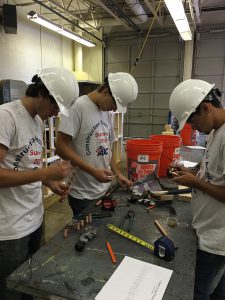 I consider it a special privilege to write about the role that America’s community colleges play in fueling the nation’s workforce needs. Because of the programming we offer, and the nature of the students drawn to them, community colleges play an important part in defining the educational models needed to equip the workforce with credentials equal to specific skill needs. In recent years, many companies have altered their degree expectations in favor of short-term workforce training credentials. At CCBC, we maintain that “everything we do is workforce development,” whether we are educating accountants, nurses, welders, electricians, or poets and dancers. Thus, it is no surprise that across the country, employers are working in tandem with community colleges to extend apprenticeship programs that enable employees to work, learn and earn.
I consider it a special privilege to write about the role that America’s community colleges play in fueling the nation’s workforce needs. Because of the programming we offer, and the nature of the students drawn to them, community colleges play an important part in defining the educational models needed to equip the workforce with credentials equal to specific skill needs. In recent years, many companies have altered their degree expectations in favor of short-term workforce training credentials. At CCBC, we maintain that “everything we do is workforce development,” whether we are educating accountants, nurses, welders, electricians, or poets and dancers. Thus, it is no surprise that across the country, employers are working in tandem with community colleges to extend apprenticeship programs that enable employees to work, learn and earn.
We know that our education agenda must be an economic agenda, and that our sector can and should be a part of a regional business solution at multiple credentialing levels. Thus, in this week, formally designated as National Apprenticeship Week, we join many of our community college colleagues in issuing a proclamation to celebrate the important role that the apprenticeship model holds for meeting industry needs…and this is not just in the trades. The country is advancing the implementation of traditional apprenticeship roles while simultaneously building non-traditional apprenticeships in industries such as health care, manufacturing, information technology and more to fill specific workforce needs. That is the zone in which community colleges thrive as well as make the greatest impact – quickly developing work-specific curriculum and forging cutting-edge industry partnerships to address workforce gaps.
Of course, the need for degrees at the associate, bachelors and doctoral levels is still high; our role prepares students for the initial, ground-level work that ultimately supports these professions. Emergent job roles are now multi-disciplined in nature, coupling advanced technology expertise with uniquely human skills: creativity, initiative, complex problem-solving, and flexibility. In addition, onsite work training requires state-of-the-art facilities, and equipment which community colleges are sometimes challenged to provide. It is not enough to train a nurse, a dental hygienist, an HVAC technician, or an advanced manufacturing technical engineer on decades old equipment. Therefore, our corporate partners who have that equipment on their worksites both give and gain from adapting to an apprenticeship model.
America’s 1,000+ community colleges are the single most important gateway to opportunity for many and the most powerful accelerator towards college and career readiness. Our college has made a commitment to Transformational Academics: a 21st century college for 21st century students for 21st century jobs. Simply put, our charge is to achieve nothing less than cutting-edge currency in everything we do: curriculum, facilities, equipment, institutional systems and faculty and staff expertise. Our business is meeting the human resource needs of our local, regional, and statewide partners. Apprenticeships offer a unique resolution to workforce demands.
